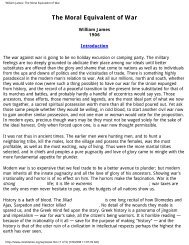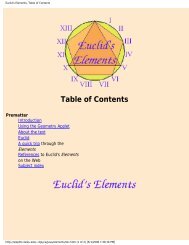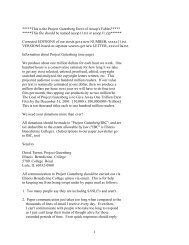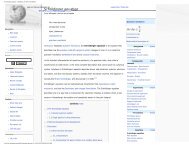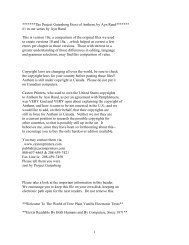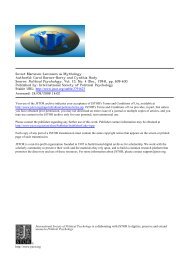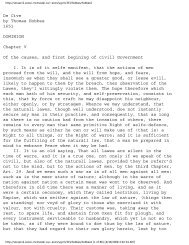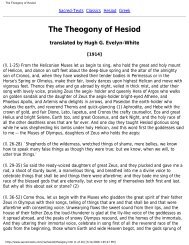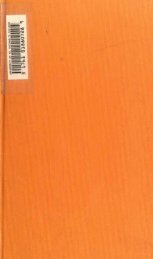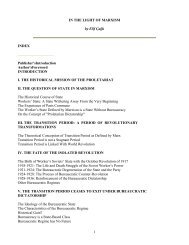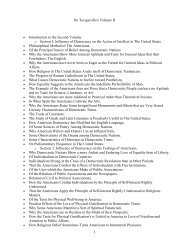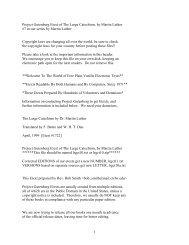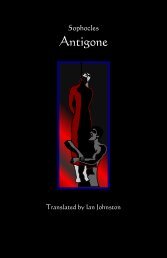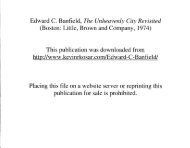Thomas Jefferson: A Manual of Parliamentary Practice
Thomas Jefferson: A Manual of Parliamentary Practice
Thomas Jefferson: A Manual of Parliamentary Practice
You also want an ePaper? Increase the reach of your titles
YUMPU automatically turns print PDFs into web optimized ePapers that Google loves.
<strong>Thomas</strong> <strong>Jefferson</strong>: A <strong>Manual</strong> <strong>of</strong> <strong>Parliamentary</strong> <strong>Practice</strong><br />
and the minds <strong>of</strong> the members having not yet been declared by any trying vote, the issue is<br />
the more doubtful. In this stage, therefore, is the main trial <strong>of</strong> strength between its friends<br />
and opponents: and it behoves every one to make up his mind decisively for this question, or<br />
he loses the main battle; and accident and management may, and <strong>of</strong>ten do, prevent a<br />
successful rallying on the next and last question whether it shall pass<br />
When the bill is engrossed, the title is to be endorsed on the back, and not within the bill.<br />
Hakew. 250.<br />
SEC. XXXII.<br />
READING PAPERS.<br />
WHERE papers are laid before the House, or referred to a committee, every member has a<br />
right to have them once read at the table, before he can be compelled to vote on them. But it<br />
is a great, though common error, to suppose that he has a right, toties quoties, to have acts,<br />
journals, accounts, or papers on the table read independently <strong>of</strong> the will <strong>of</strong> the House. The<br />
delay and interruption which this might be made to produce, evince the impossibility <strong>of</strong> the<br />
existence <strong>of</strong> such a right. There is indeed so manifest a propriety <strong>of</strong> permitting every member<br />
to have as much information as possible on every question on which he is to vote, that when<br />
he desires the reading, if it be seen that it is really for information, and not for delay, the<br />
Speaker directs it to be read without putting a question, if no one objects. But if objected to, a<br />
question must be put. 2 Hats. 117, 118.<br />
It is equally an error, to suppose that any member has a right, without a question put, to lay a<br />
book or paper on the table, and have it read, on suggesting that it contains matter infringing<br />
on the privileges <strong>of</strong> the House. Ib.<br />
For the same reason, a member has not a right to read a paper in his place, if it be objected<br />
to, without leave <strong>of</strong> the House. But this rigour is never exercised, but where there is an<br />
intentional or gross abuse <strong>of</strong> the time and patience <strong>of</strong> the House.<br />
A member has not a right even to read his own speech, committed to writing, without leave.<br />
This also is to prevent an abuse <strong>of</strong> time; and therefore is not refused, but where that is<br />
intended. 2 Grey 227.<br />
A report <strong>of</strong> a committee <strong>of</strong> the Senate on a bill from the House <strong>of</strong> Representatives, being<br />
under consideration, on motion that the report <strong>of</strong> the committee <strong>of</strong> the House <strong>of</strong><br />
Representatives on the same bill be read in Senate, it passed in the negative; February 28,<br />
1793.<br />
Formerly when papers were referred to a committee, they used to be first read: but <strong>of</strong> late,<br />
only the titles: unless a member insists they shall be read, and then nobody can oppose it. 2<br />
http://www.constitution.org/tj/tj-mpp.htm (34 <strong>of</strong> 70) [4/14/2008 6:37:46 PM]



